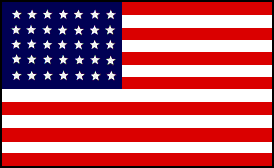

|
The town is situated on an eminence that looks down upon the Potomac. These hills extend
in irregular sweep for miles, whilst between two distinct ranges flows the river. It apparently
hangs askant upon the southern declivity of the opposite hill and one may trace, as a background,
the faint almost noiselessly, the volume of smoke ascending from a locomotive on the Baltimore
and Ohio Railroad, while the turpid waters of a deserted canal running parallel with the river, the
thick set mountain shrubbery, presents an impressive view that nature alone can paint. And then
how beautifully she conforms herself to the seasons - this time clothing the foliage with the russet
hues of fall. Ever changing she is still attractive, and whether in the verdant bloom of summer,
or the fallen leaf of winter - "crisped and sere" - it still speaks to our feelings and bids us look. -
through nature to Nature's God.
| |

|
On October 28th, just one year from the date of the muster-in of the Regiment, at Lebanon,
orders came to the Regiment to prepare for a movement. The Regiment made a night march
to Williamsport, remained two days and thence to Boonsboro, where we halted in sight of the
battlefield of Antietam. Next morning, at daybreak we continued on, passed South Mountain,
thence to the battlefield of Burkettsville, and reached Berlin by November 1st, where we
remained over Sunday.
| |

|
On Monday morning we crossed the Potomac on pontoon bridges, passed through Lovettsville,
Purcellville, Uniontown and Upperville, then taking a line of march from west to east, from
the blue ridge to the Kittoctan Mountains, reached White Plains, a station on the Port Royal
and Manassas Railroad, not far from Thoroughfare Gap. On Thursday, November 6th.
| |

|
While resting at this point a cold storm of rain, sleet and snow fell, the first snow of the season,
covering the ground with its mantle of white; but fearful of the dazzling brightness of old Sol, it
fled before his approach, like the vanquished do before the conqueror's mighty power. On Sunday
morning, however, "Jack Frost," anxious to annoy us with his stinging chill, transformed with
magic power the little rivulet into ice, and left his white tracks all over hill and dale, tingling our
finger ends with that biting sensation which he alone can accomplish.
| |

|
We reached New Baltimore on the 9th, and the next morning orders were read from President Lincoln
that Gen. McClellan had been relieved from the command of the Army of the Potomac and that
Major General Burnside was his successor. To the men it came as a blow, as he was the idol of the army.
| |

|
Gen. Burnside reorganized the army by forming Right, Centre and Left Grand Divisions. The Right
Grand Division consisted of the Second and Ninth Corps. Under Gen. Sumner. The Centre Grand
Division of the Third and Fifth Corps, under Gen. Hooker, and the left Grand Division of the First
and Sixth Corps, under Gen. Franklin.
| |

|
Gen. McClellan issued his farewell order, which was read to the Army of the Potomac, after
which Gen. McClellan, Burnside and Sigel, with their staffs, and amid the booming of cannon,
and music of the bands of "Hail to the Chief" and "The Star Spangled Banner." The review was
held by Corps. Gen McClellan receiving cheers as he passed along the line, while some regiments
remained silent.
| |

|
Brig. Gen. A.P. Howe, of our Third Brigade, was placed in command of the Second Division.
The weather was intensely cold, the mud almost made roads impassable. The sufferings of the
troops was intense, the sick suffered greatly, and six soldiers of the Third Brigade, Second
Division, died on the ambulances. But according to Lieut. Harry J. Penrose, of Co. B. at the
time, who held to the theory that we ought to be more happy here than at home. He said
that "Tis distance lends enchantment to the view," and reducing the thought to practice, we
should have appreciated then our position more than we did.
| |

|
On November 11th, we reached Brook's station the first day, then after a delay started again,
and made six miles, reaching Falmouth Station, opposite Fredericksburg, On the 16th, Sunday
morning, we left for Stafford Court House, reaching there on the 18th, about eight miles from
Acquia Creek landing, and encamped.
| |

|
On December 4th the 93rd and 139th were detailed for picket, with three days rations and on the
7th three days more were issued, except meat, which was for one day only. The rest of the Brigade
had struck tents several days before and entered upon the march toward Fredericksburg. On the
5th snow fell to the depth of three inches-making picket duty by no means pleasant. The cold
also was extremely painful in many ways, interfering with sleep and rendering "Orthello's occupation"
an unenviable one indeed.
| |

|
Col. McCarter, while the regiment was stationed at this point, departed for home. Before leaving he
gathered the "boys" together and delivered a short farewell address to them. He spoke in sincere and
earnest manner of his efforts to serve them faithfully, and called upon Heaven to witness the
attachment he had always had for his men. He was very much effected while biding them "farewell,"
and the "boys" felt the parting quite as sensibly.
| |

|
Sergt. Edwin M. Ebur, of Co. A drew up a memorial of esteem for the Colonel and secured nearly
every signature in the whole regiment. Lieut. Harry j. Penrose, of Co. B, presented the same at
the close of the Colonel's address. Lieut. Penrose spoke in a feeling manner of the sentiment o the
regiment towards Col. McCarter, assuring him that he left with the good wishes of everyone. After
Lieut. Pensrose had finished speaking the Colonel received this token-thanking the "boys" for their
kindness and then bade all "good-bye" with a sorrowful look that betokened the pang he felt at parting
from those with whom he had been so long and pleasantly associated.
| |

|
Maj. John M. Mark was in command of the regiment and on December 7th, served as "Brigade Officer
of the Day," in this capacity having charge of all the pickets in the Brigade. After remaining on picket
until the 10th the pickets were called in and the march of eighteen miles to near White Oak Church was
entered upon, and reached Fredericksburg about noon, but long before cannonading was plainly audible.
| |

|
The cannanading continued all day and from the high positions where our guns were placed,
squads of Rebel cavalry and infantry could be plainly described. The view and grandeur of the
sights witnessed on this occasion were amply remunerative for all the hardships and privatious
endured on the march through mud to this place. Lines of cannon extending along this range
for miles, were watching with their Cyclops eyes the progress of events on the opposite of the
Rappahannock. The noise of the explosion near by would cause one to look, with anxious gaze,
in the wake of the hissing messengers, and, far away, a little cloud of smoke would denote its
mission ended while imagination could almost see arising from its midst an apparition of Death,
that in a terrible crash was flinging his spirit minions of destruction in all directions. About dusk
the regiment prepared for crossing, but before we reached the river, the orders were countermanded
and we spent the night on the north side of its banks.
| |

|
On Friday, December 12th, the regiment under the command of Colonel John M. Mark, crossed
the Rappahannock, and were halted near the bank, all day long; regiment after regiment came over,
and it really seemed as if there was no end to the columns of cavalry, artillery
and infantry-representatives of all the loyal states-were pushing forward, in good spirits and
seemingly "eager for the fray."
| |

|
Our Division was held in reserve until Saturday afternoon December 13, 1862. Then we were
hurriedly marched out and formed in line on the left of Gen. Franklin's left wind, in support
of the Pennsylvania Reserves, Gen. Newton, in command of our Division, moved along our line
and ordered the "boys" to unsling their knapsacks and after resting for a short time we were
ordered forward to the Bowling Green road, protected by a large bank of earth.
| |

|
We had not rested there any length of time when the Rebels opened a terrible cross-fire upon us.
The range of our situation was so well sighted, that had it not been for this natural defence, but
few members of the 93rd would have been left to "tell the tale." This was decidedly the heaviest
shelling to which we were ever subjected, and was far from a pleasurable Saturday night.
| |

|
The Regiment was kept in line of battle during the entire time we were across the Rappahannock,
ready for a moments notice and this continued over Sunday. On Monday morning we were
awakened with orders to get ready at a moments notice, and received an order from Col. Rowley,
in command of the Brigade, to move to the rear and two hours afterward had recrossed the river,
and before morning we were drenched by a terrible rain, and after being drenched out of our beds,
waited until daylight, when we were marched about one-half mile to the rear and encamped.
| |

|
The old Richmond stage road runs down the middle of the plain, being slightly nearer to the
ridge, fronting the battle line of the 93rd. Between the road and the ridge is the Richmond
and Fredericksburg railroad and beyond it was a wooded ridge. Gen. Meade formed with Gen.
Gibbon on the right and Gen. Doubleday on the left, in our front, at 9 A.M., andat 1 P.M.
personally led the charge of the Pennsylvania Reserves. The attack was unsuccessful, and
the battery which the 93rd supported was destroyed.
| |

|
Gen. Mead's Division retired with a loss of 1,853 killed and wounded. Gen. Sumner ordered
Couch's 2nd Corps to attack on the right at 1 P.M. and Gen. Hancock and Gen. French's
Division were forwarded and defeated. Gen. Hancock lost 2,032 and Gen. French 1,160.
Gen. Howard's Division supported and lost 914. Gen. Sturgis' Division of the 9th Corps lost
1,000, or more than 5,000 men were lost in this attack.
| |

|
On the right, in front of Fredericksburg, Gen. Humphrey's Division failed in carrying Marye's
Heights and in fifteen minutes lost 1,009 men. Gen. Sykes' Division lost 228, and the entire
loss, as officially reported in the battle of the Army of the Potomac was: Killed, 1,284;
wounded, 9,600; total losses, 12,653. Two-thirds of this loss was sustained in Gen. Franklin's
left Grand Division, led by the Pennsylvania Reserves, leaving 1,555 to offset the Union loss
on the right.
| |

|
The attempt to capture Marye's Heights was a failure, due to a want of concentration of action,
for even the entire Sixth Corps was not brought into action, but forced to stand in an open plain
exposed to a fierce artillery fire without being given a chance to forward. Maj. Gen. Wm. F. Smith,
in command of the Sixth Corps, was ordered to cover the bridges during the battle and could not
possible leave its position until relieved by troops. Gen. Smith in his report says:
| |

|
"General Burnside failed to keep a promise he made to me the day before which would have relieved
the Sixth Corps from covering the bridges and put those gallant men at the head of the assaulting column
the next morning at daybreak."
| |

|
In the attack 170 cannon belched forth on Fredericksburg soon after noon of the 13th, and it presented
a terrible but magnificent scene. The union forces were 113,000 and the Rebel forces 78,513. Gen.
Franklin's line extended from Deep Run two miles toward the Mattapony, and the charge of the
Pennsylvania Reserves was made one and one-half miles from the Rappahannock River to the wooded
ridge, and was in plain sight of the line of battle of the 93rd. Gen. Meade had a force of 16,000 men,
passed over five rifle pits and reached Gen. Lee's military road actually driving the first of the Rebels.
Had the Sixth Corps been ordered to charge, the Rebels would have been defeated and the battle a union
victory, but although Gen. Franklin was supported by two divisions from Gen. Hooker, so that his force
numbered 54,000 men, the left wing of the Pennsylvania Reserves was turned while the grand old Sixth
Corps was not allowed to complete the victory so nearly accomplished by the Pennsylvania Reserves
on its immediate front.
| |

|
Fredericksburg lies in a broken plain on the southern bank of the Rappahannock; the town is oblong in
shape, with its length along the river. The plain on which it is situated is formed by a bold ridge, partly
wooded at the time, which touching the Rappahannock about Falmouth, pursues a course in the rear of
the town. On the north bank the city is confronted by Stafford Heights, and was held by the union army.
The plain upon which Fredericksburg is situated is six miles in length, and averaging two and a half miles
in breadth, narrowing in front of the town to less than a mile and spreading out where the Sixth Corps
crossed to three miles.
| |

|
Between the city of Fredericksburg and Marye's Heights is the valley
of the Rappahannock and the Heights is called "The Mountain," and
the ground rises in several successive terraces, each terrace
commanding the one below and is an almost impregnable fortress
of defence.
| |

|
The Union loss was killed, 1,284; wounded, 9,508; missing, 1,775;
total, 12,657. The Sixth Corps loss, killed, 54; wounded, 332;
missing, 70; total, 456.
The Rebel loss was killed, 668; wounded, 4,116; missing, 653,
total Rebel loss, 5,377. As only 32,000 of Burnside's 100,000
men who crossed the river were in action against 25,000 Rebels,
the losses were unusually large.
| |

|
The Sixth Corps was marched to White Oak Church, so called, from
a little white-washed meeting house, without bell or steeple, in
the midst of white oak trees. It occupied nearly the center of
the line, and the Army of the Potomac formed a line from Falmouth
to Bell Plain, and these were the winter quarters for the balance
of 1862.
| |

|
Maj. John M. Mark, was commissioned Colonel of the regiment to
date from November 27, 1962, and took command of the Regiment.
This was Thanksgiving Day for 1862, but it passed without any
unusual significance in the Regiment. Col. Mark was heartily
greeted by many of the officers, and his promotion met with
approval by the men.
| |
 These are a few of the key Union Generals involved.
These are a few of the key Union Generals involved.
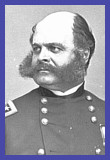



Burnside.........Couch..........French...........Franklin

Hancock
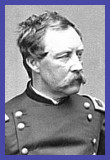
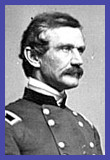


Howe........Humphreys........Howard.........McClellan

Meade
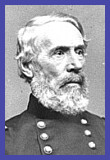
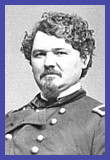
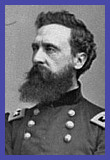
Sumner..........Sturgis..........Sykes
[MY OPINION]
The best site on the web about the battle of Fredericksburg.
CHECK IT OUT!
The Battle of
Fredericksburg

